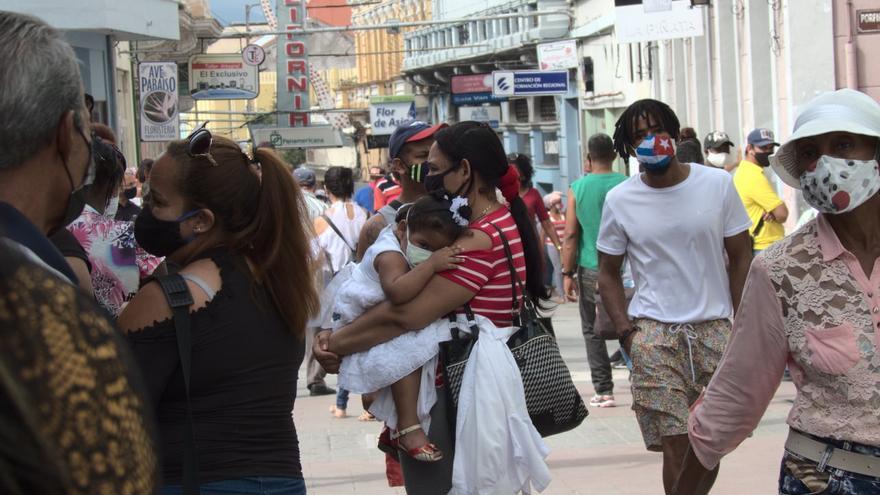
![]() Rachel Cruz/14ymedio, Madrid, 2 June 2022 — The feminist Observatories of Alas Tensas (OGAT) and of Yo Sí Te Creo in Cuba have begun to include cases of “vicarious femicide” in their records of victims of sexist violence, a methodology that is applied in Spain and with which they intend to make visible the lack of protection of the children of battered women.
Rachel Cruz/14ymedio, Madrid, 2 June 2022 — The feminist Observatories of Alas Tensas (OGAT) and of Yo Sí Te Creo in Cuba have begun to include cases of “vicarious femicide” in their records of victims of sexist violence, a methodology that is applied in Spain and with which they intend to make visible the lack of protection of the children of battered women.
Ileana Álvarez, director of OGAT, says that a paradigmatic case of vicarious violence was the murder of Carlos Duviel Sánchez Estévez, 10 years old, at the hands of his father, in Caibairén, in April 2019. “He is a father who kills his 10-year-old son with the simple aim of inflicting harm on his mother,” she says.
In this case, reported by the journalist Pedro Manuel González, the father was serving a sentence for the attempted murder of the minor’s mother. The man had a history of sexist violence and was on probation when, after obtaining permission from the teacher, he took his son out of school, took him to a secluded place and murdered him.
“You realize that this death could have been avoided if the minimum protection protocols for victims of sexist violence had been complied with, since this man was in prison for having stabbed the mother of the murdered child several times,” says Álvarez.
According to Álvarez, since the independent observatories began to count victims of sexist violence, at least six children have been murdered solely for the purpose of harming the mother. continue reading
“Including other types of femicide in the observatories, such as the vicarious, is important to understand how sexist violence operates, how it is mainstreamed into other areas, and helps to implement effective public measures and policies that allow the prevention and eradication of violence against women,” says the activist.
The model they have taken as a reference is Spain, where there have been 47 murders of minors in the context of vicarious violence since 2013. The kidnapping and murder of the sisters Anna and Olivia Gimeno, aged 6 and 2 respectively, at the hands of their father in April 2021 once again put the spotlight on this type of violence. The Law for the Comprehensive Protection of Children, approved in 2021, has among its tasks the close supervision of the visitation regime in cases where it is determined that there is a risk to minors, as was the case of Carlos Duviel.
In Cuba, however, the public debate on vicarious femicides has not yet been opened. Álvarez points out that it is a difficult issue to make visible in the country, which until recently (2019) denied the existence of femicides.
“If you deny something, you cannot create laws and implement public policies to resolve it. In Cuba there is no law against gender violence and femicide is not criminalized in the Penal Code; there are no shelters, no education in feminism, neither in schools nor in public institutions such as the police, the health system, etc. that help to understand and prevent gender-based violence,” she comments.
Álvarez says that the femicides documented by OGAT and Yo Sí Te Creo are an underreporting, since being independent observatories they do not have the support of the government and must work clandestinely so as not to be criminalized. Cuba’s Regulations such as Decree Law 370, the Gag Law, and Decree Law 35 affect not only the work of the observers, but also discourage the families of the victims from denouncing on social networks or speaking to the independent press. For these reasons, Álvarez points out, “despite the great effort we make, it is impossible to guarantee that we can document all femicides.”
However, Álvarez is optimistic. “You can fight in multiple ways against femicides, and also against vicarious femicides, as long as there is a firm commitment to the fight against gender violence to mainstream all structures of society: it is important to name vicarious femicides, because what is not named cannot be prevented,” she concludes.
____________
COLLABORATE WITH OUR WORK: The 14ymedio team is committed to practicing serious journalism that reflects Cuba’s reality in all its depth. Thank you for joining us on this long journey. We invite you to continue supporting us by becoming a member of 14ymedio now. Together we can continue transforming journalism in Cuba.
